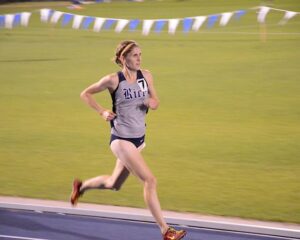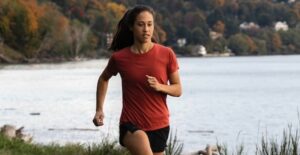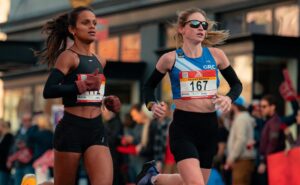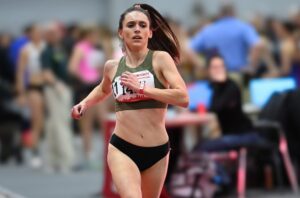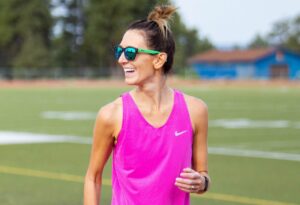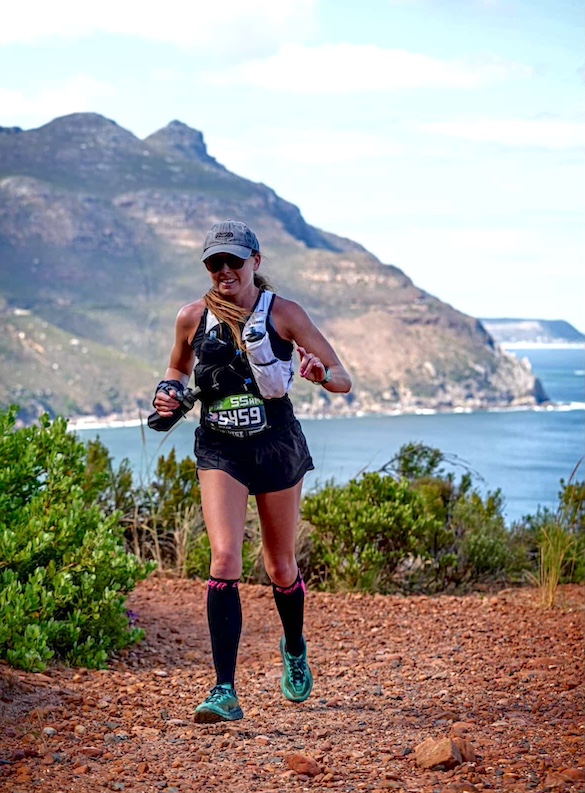
Over the past seven years, I’ve told a lot of stories of people who are on the rise or at the peak of their running careers. Most of them are outliers in one way or another. But especially for those who start young, a running career can stretch for many years past the point when an athlete is running their fastest times. Anyone who is fortunate enough to run for a long time is eventually going to slow down, whether it’s because they have no choice, their priorities change, or something else.
All three of the athletes I’m featuring below are still young, they’re still fast (though not necessarily their fastest), and they’re still avid runners, but their circumstances, goals, and/or priorities have changed. I wanted to tell some of these stories, because it’s normal and healthy for the role running plays in a person’s life to shift over time. This is part two in a series, and you can read part one here.
—–
Mattie Webb, 32, started out as a swimmer, but she made quick progress when she took up running during high school. By her senior year, she accomplished one of her biggest goals when she qualified for the 2010 Foot Locker Cross Country Championships.
But after that, she began to feel more pressure attached to her running. She began restricting her food intake with the hope that it would make her faster, and in the process, she developed an eating disorder. “A lot of people have gone through this,” Webb told Fast Women. “But at the time, not a lot of people were talking about eating disorders. I felt like I was the only person on the planet dealing with this problem.”
Within a couple of weeks of starting college at NC State, she got injured, which made it tough for her to connect with her teammates. She worked hard to make a strong return but was still underfueling, so she quickly got injured again. She ultimately ended up medically retiring from the sport, which meant she could keep her scholarship, but she could no longer compete for the school, which was devastating to her at the time.
Webb spent her final year and a half at NC State getting intensive treatment and finding other ways to be active, like playing intramural basketball and taking exercise classes. “I found a healthy relationship with activity and movement, even beyond running,” She said.
By the time she arrived at the University of North Carolina for graduate school, she was in a much better place. After getting many doctors to sign off on it, she was allowed to walk on to the cross country and track and field teams and get a do-over on her college running experience. Without a scholarship, she felt less pressure. And she had spent enough time out of the limelight that she felt like no one was following her results anymore.
“I felt like I had more freedom to pursue running on my own terms,” she said. “I wanted to make up for lost time, have the chance to be a good teammate, and help others. I was at peace knowing that I might compete for two years and not PR. And I think it was remarkable that I was able to get to a point where that no longer felt like a priority.”
In loosening her grip on her performance goals, Webb was able to have a great experience. In her first semester on campus, she and her teammates won the 2014 ACC cross country title. She didn’t have a great race that day, but she was still thrilled to be a part of it and celebrate the team’s accomplishment. And in her second year on the team, she PRed in all of her events, including running 17:04 for 5,000m.
Webb kept running after she graduated from UNC in 2016, and she won her first half marathon in 1:21:35. But when she began working toward her Ph.D. in history the following year, running became less of a priority. In 2019, she began working with her current coach, Terry Howell, and he helped her become more consistent with her training and challenge herself at new distances.
“At this point, I realized my relationship with running was more about seeing what I could do regardless of the times,” she said. “It was more like, ‘How can I challenge myself in a new way?’ I wouldn’t say I have necessarily run earthshattering times, but I’ve been able to keep improving and keep it interesting.”
And if she starts to feel too much pressure to hit certain times, she’ll focus on trail races for a while, where there’s less emphasis on time and fewer opportunities for comparison. Spending time around runners who have never aspired to be elite marathoners also helps her. “They sort of bring you back to Earth by being like, ‘Why are you mad about your time? You finished the Boston Marathon, you should be happy about that.’”
Webb often chooses her races based on where she or her husband wants to travel, and she enjoys having the freedom and base fitness to hop in races at the last minute, when the opportunity arises. Next up, she’ll run the Chicago Marathon. She goes into races with tiered goals. She has run one sub-3:00 marathon, and she’d love to do it again, but she’s always ready to adjust on the fly.
“Whenever a marathon feels like it’s going south quickly, I try to slow down and enjoy it and just be happy with the fact that I can finish a marathon, which is always a cool accomplishment in itself,” she said.
While she was injured at NC State, Webb began to get more serious about her education, which has ultimately led to a career as a social and political historian of the U.S. and southern Africa. Her work and schooling have taken her all over, and running has been a great way for her to make new friends wherever she goes. Her research has led her to spend a lot of time in South Africa, and she was able to race the historic 85.9K Comrades Marathon last year.
Her advice? “Know that running will evolve with you, throughout your life, and it doesn’t have to be static,” she said. “It doesn’t always have to look the same. That in itself is really exciting. There are all these opportunities beyond the immediate future, and that’s really cool, because not all sports [are like that].”
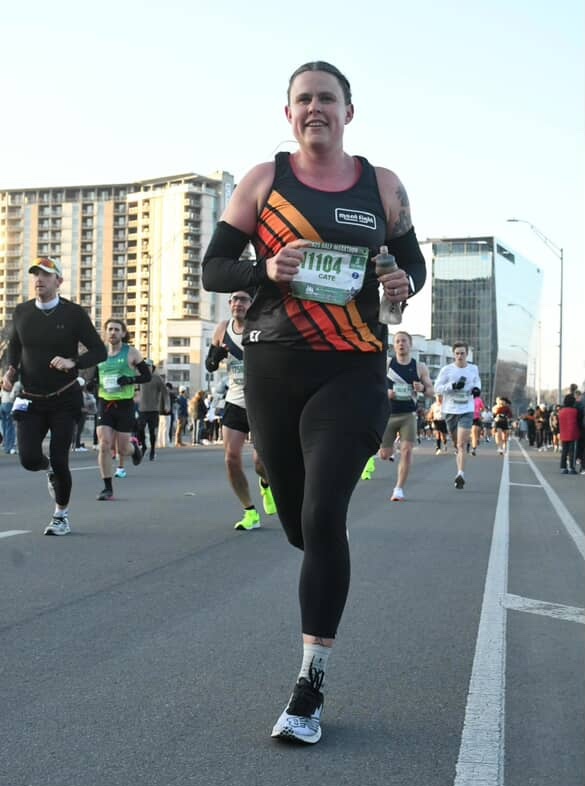
At 35, Cate Barrett has already been through many phases in her running career. She began running at age eight, but as a homeschooler, she didn’t have a lot of guidance until her junior year, when she began working with a knowledgeable coach. “It was like four years of high school development in one year,” she said, ”Which was super fun.” That year, she ran her first 1600m race in roughly 5:35. The following year, she ran a 4:50, an incredible improvement.
She was recruited to run at Baylor University, where she continued to progress. By her senior year, she ran 16:13 for 5,000m. She tried to run a fifth year in the NCAA while attending graduate school, but she developed a stress fracture in her heel and her collegiate career was over.
After college, she spent about two and a half years training with the Rogue Athletic Club. She worked hard, but she could not match her college times. In 2016, she watched the U.S. Olympic Marathon Trials from her couch and decided she wanted in. Her team disbanded later that year, and in 2017, she kicked off her marathoning years.
Focusing on a new distance helped reinvigorate Barrett’s running career, as did being part of her local Oiselle chapter, which later turned into a small sponsorship. At the 2018 California International Marathon, she qualified for the 2020 U.S. Olympic Marathon Trials, running 2:43:40. Her online community grew, and after several years of spinning her wheels post-collegiately, it felt good to accomplish something that meant a lot to her and came with a certain status within the running community. Barrett’s Trials race did not go the way she would have liked, but she looks back on that chapter of her running career fondly.
When racing shut down due to the pandemic, she decided it was a good time to have a baby. Initially, she was able to train, and she even ran a sub-5:00 downhill mile during her first trimester. But near the end of her second trimester, she stopped running due to back pain. Her first child arrived in January 2021.
“I just thought [my speed] would come back,” she said. “I went to pelvic floor PT and I thought I was doing all the right things. I had some little injuries, and finding time to get out the door was hard. There was a lot of adjustment with our schedules, obviously, taking care of a baby… I always felt like improvement was just around the corner, and then there would be another setback.”
After a year of that cycle, Barrett decided to have a second child, who arrived in October 2022. Throughout her running career, Barrett had coaches who would ask for a little more commitment to the sport in one way or another, anything from running more to getting more sleep. Whatever her coaches recommended, she would find a way to do it. Running came first in her life for a long time. But at the same time, her responsibilities increased, first in her work life, and then when she had kids. And after having kids, she found her limit.
“There was no other way for me to problem-solve this to be a good runner anymore,” she said. “Like, in theory, I would need to run more to be better at running. But when am I going to do that? I deal with little injuries here and there, so I go and do my physical therapy just to be able to run 23 miles a week. There’s such a large gap between where I am and what I think I would have to be to do competitive training, and I don’t know how I would do it.”
Barrett did put a little more emphasis on her training for a stretch, and she got herself down to a 1:41 half marathon earlier this year. She was pleased with it, but she hasn’t felt the tradeoffs that would be required to go after bigger goals would be worth it. “Since I’ve done it before,” she said, “it doesn’t feel worth doing again, knowing that I would have to work harder than I did before to not even be as good as I was.”
Barrett says she has gotten more honest with herself in the past year about what her priorities are. “I look at my actions, and my values are not what I thought they were,” she said. “I would love to be faster, but I actually am doing what I want to be doing. I just wish it was different. I care about my career, I care about my kids, and I care about getting enough sleep and trying to feel like a healthy human over trying to feel like the fastest little running robot that I can be. These choices have gotten me to where I am.”
There are aspects of being fast that Barrett misses, like the structure, goals, and purpose that it brought to her training. She misses feeling like her results matter, but at the same time, she knows she’s engaging with the sport in a healthier way now.
For a long time, she feared slowing down, and it happened. “It was painful, but I’m okay now,” she said. “I think if I had realized that I could still enjoy running, maybe I wouldn’t have been upset about the changes I was seeing. But I’m proud of myself for the humility I’ve demonstrated in continuing to do the sport.”
—–
Katie Newton, 34, didn’t set out to be a professional runner. Even though was a multi-time All-American for Boston University, and twice placed fifth at an NCAA championship, it wasn’t until after she completed her collegiate career that she learned she would have pro opportunities. She put her planned career as a speech therapist on the back burner and ran professionally from 2013 until the end of 2019.
She needed to start working within five years of getting her master’s degree to avoid having some of her credentials expire, so after about 4.5 years of mainly focusing on running, she began working part-time as a speech-language pathologist as well. And in the end, that made her transition out of professional running easier, because already had a clear career path.
At the end of 2019, Newton’s contract with the B.A.A. was ending. She figured she would have an opportunity to continue in the sport, but she wasn’t running as well as she would have liked and her contract was likely to be reduced. For a variety of reasons, she decided to step away from professional running. She felt like she was plateauing, she wasn’t enjoying it as much, she was dealing with some injuries, and she was ready for a break. She was also expecting her first child.
With a husband who works long hours as a soccer coach, she didn’t want to have to put her child in daycare before she felt ready, and she didn’t want to have to stress about getting enough sleep, and she didn’t want to have to worry about racing again within a certain timeframe. She was only 29 when she “retired” from professional running, so she potentially had many years of running ahead of her.
Newton’s first child arrived in August 2020 and her second a little over two years later. She has continued to work as a speech-language pathologist, and she also coaches through Running Joyfully. These days, her schedule doesn’t leave her a lot of time for running. She aims to stay fit enough to go for a 45-minute run with friends and be able to hold up her end of the conversation. She also likes to put races on the calendar here and there, which helps get her out the door to train.
In August, she ran the Falmouth Road Race in 44:20, running 6:20/mile for seven miles. It was about a minute per mile slower than she ran at her fastest, but she had a blast. Newton figures that in theory, she is young enough that she could probably get back to running fairly fast by her standards, but she doesn’t have the time, resources, or motivation to put in the same level of work that she used to.
“I don’t know if people realize how much professionals put into it,” she said. “That was my full-time job, so to run a 31- or 32-minute 10K isn’t [a matter of] me just going out for a couple more runs per week.”
Newton takes issue with the messaging that if it’s a priority, you’ll get it done, because it doesn’t acknowledge the widely varying circumstances everyone is dealing with. She knows that it does her no good to compare herself to someone who is paid to run full-time, or those who have flexible jobs or a lot of support with child care. “If you’re not getting paid as a professional athlete, are you going to pay hundreds of dollars a week for childcare to go work out? Probably not, unless you’re very well off,” she said.
Joining the masses has been an adjustment at times. She almost missed the start at Falmouth, because she didn’t realize how early the non-pros needed to get there. But she mainly just looks back on her pro running years fondly, rather than having any regrets. “I’m not running close to my [previous] times, but I don’t feel like I’m getting that much less enjoyment out of it,” she said.
Newton enjoyed seeing 35-year-old Emily Infeld, her occasional competitor in the past, win the 10,000m at the USATF Outdoor Championships earlier this summer. It’s fun to imagine that if she stuck with professional running, she might have had a breakthrough moment. But she’s realistic about how rare those moments can be.
“While I’ve been having kids, she’s just been grinding and getting stronger,” she said. “It puts it into perspective of what it took for her to get there. That was years of dealing with injuries and setbacks. But then I also see people who are closer to my level who are still running but they haven’t had a major breakthrough. I assume they really enjoy it, but I’m like, ‘Oh, maybe that would have been me.'”


